Transcription
Reply ID: acvk
September 20, 2016
Calhoun25,
Thank you, again, for taking time out to respond to my posts. Prisons are, even in the "best" of times, utterly lonely and miserable places to be, so hearing from someone in the outside world really means a lot, especially when the conversations are so intellectually stimulating. Don't get me wrong, not everyone in here is stupid - in fact, many are actually quite intelligent - but more often than not, the very nature of prison environment keeps these lights from being seen, drowned out by guys fussing and fighting with each other over the dumbest things; telling "war stories" of life on the streets or in other prisons; or worse, fantasizing about the offenses they're going to commit when released. So to you, and everyone else who's posted a reply, or who might post a reply in the future, thank you, from the bottom of my heart, for taking time out of your day to respond.
In on of your responses, you asked me for the name of the PBS documentary about Welfare's "Back to Work" program. It's bee a while since I seen it, and sadly, I don't have access to the internet, but if memory serves me correct, it was an episode of Point of View, or "POV", a regular series on PBS, and if not POV, the Independent Lens. (Upon further reflection, it might actually been Independent Lens and not POV.) Hope that helps, but if not, you should be able to do some sort of search on the PBS website, and should that fail, them I'm sure someone at PBS knows the answer, if you're willing to send an e-mail.
You say that you wonder whether or not there's a "feasible solution to igniting local job growth in poor areas." Personally, I can't see why not. It only requires two things: an ability to think "outside the box", and the money to invest in whatever ideas that happen to come up.l I've come up with a number of ideas that could provide, if not an ability to bring income into the community, at least the ability to provide for the community in question. Sadly, my incarceration, and lack of funds, currently prevents me from implementing some of my ideas, but I'm hoping that both of these conditions are merely temporary.
In your response, you said that the minimum federal wages for a non-inmate was $7.25 and hour, while the maximum wages for an inmate was $4.73 a day. Honestly, I though that both the federal minimum wage, and the maximum inmate wage were significantly higher than that, but as far as the federal minimum wages are concerned, I believe this is solely because of how high the State of California's minimum wages are. Either way, neither of these amount to much. It's no wonder why so many people are living in poverty!
As far as your question regarding why the state has to pay inmate wages with money from its own coffers, to the best of my knowledge, this isn't exactly what happens. Inmate wages fall into one of two basic categories. The first is when the inmate works for a state owned and operated company, usually in manufacturing. The profits, which are quite significant, are used, not only to pay the free staff who oversee the inmate population, but also the inmates employed by the company. The second is when the inmate works directly for the prison, in which case he's paid with money from the Inmate Welfare Fund (IWF), or at least, that is the way it works in California. The IWP receives its money off of whatever profits generate from the inmate population, usually through the sales of goods in the inmate canteen, pictures taken in the visiting room, investments made with money in the IWF, etc. Either way, the inmates, to the best of my knowledge aren't paid with money in the state's coffers, and in the event that they are, you can rest assured that the state recuperates its money by profits from selling inmate manufactured goods.
As far as what's produced at a "typical inmate job," the products and services are every bit as varied in here as they are in the free world. For example, when I was at the California Men's Colony (CMC) in San Luis Obispo, there were a number of state owned businesses, called the California Prison Industry Authority, commonly referred to as the CAPIA or simply PIA. There was the Knitting Mill, which made the socks worn by the inmate population, and sold to many nonprofits, the fabric used for manufacturing t-shirts and the cuffs used in making gloves. There was also the Boot Factory, which made the prison boots worn by the inmate population, the Jacket Factory, which made the jackets worn by the inmates, and even some jackets worn by the parole officers. We also had a Print Plant, which made everything from the license plate stickers to, literally, any type of printed material needed in large quantities by the entire state of California There is also PIA Laundry, which contracted to clean the laundry of not just the inmate population at the CMC, but also a number of other prisons and mental health facilities. Here at the Mule Creek State Prison (MCSP), we have the Meat Processing Plant, plus our PIA Laundry, on this yard, with a Coffee Roasting Plant on another yard, plus a lunch packing plant and a number of other plants scattered throughout the various other yards. Folsom manufactures the traditional, and stereotypical, license plates and there are even some prisons that recycle, or at least, used to recycle, computers. While each factory claims it's being operated to provide the inmate population with a chance to meaningfully participate in their rehabilitation, the reality of the situation is much different. It's all about maximizing profits, which is why inmates are paid so little, despite the fact that their products often sell for more then their comparative counterparts in the free world. Still you can rest assured that someone's raking in what's left over after the inmates receive their meager wages.
If you're curious to know why inmates are paid so little when the results of their labor generate so much profit (especially when a fair wage could dramatically increase the inmate's chances for a successful re-entry into society), take a look at the 13th Amendment to the United States Constitution. Contrary to what we were taught as children, slavery and involuntary servitude were not abolished in America. At least, not in the sense you might think. The ownership of people as slaves and the use of involuntary servitude by the government was legalized. Perhaps this explains why America, who represents only 5% of the world's population, has more than 25% of the world's inmates. It might also explain why there are so many men in prison and so few women, or why the overwhelming number of people incarcerated qualify as poor. It might also explain why so little effort is put into financially preparing the inmate for his release. Prisons deduct every possible cent from an inmate's wages for every conceivable cause. Because of these repeated, and mandatory, deductions, the inmate is literally unable to save anything for his eventual release, nor is he willing to make the attempt out of fear that the prison will only end up confiscating what he earns in the long run. The end result is that, when it's time for him to be released, he's only got the $200 check given to him by the prison, only to see the prison taking most of that back, for bus fare, clothes, etc., and what isn't taken from him by the prison is put onto a prepaid debit card, operated by a private company, and subject to additional mandatory fees anytime the, now former, inmate attempts to withdraw funds.
In regards to ethics concerning time travel, imagine this: you've just traveled back in time to Adolf Hitler's birth. What do you do? Do you end his life, knowing that if you do, you've stopped World War II and all its atrocities" Or do you allow him to grow up, knowing that he comes pretty close to committing genocide? Murder is wrong, even under these circumstances, but doing so means the lives of so many are saved, but doesn't this bring its own complications in and of itself? And who's to say that thousands of people killed during the war wouldn't have gone on to become serial murderers, to lead their own world war or to bring about their own genocide? No matter how you look at it, I just can't envision the ability to travel throughout time without someone caving into their desire to change history, even if it's just their own personal history. We all know the theoretical dangers of altering the timeline, and yet, despite this knowledge, can any of us honestly say we'd be able to resist the temptation?
Another thing to take into consideration is the fact that ti's our experiences, and how we deal with them, which define who we are today. Sometimes, the more traumatic the experience, the more it helps to define us. For example, to this day, I maintain my innocence to the crimes I was convicted, but at the same time, as horrible as prison is, it's made me a much, much better person. If I could travel back in time and make whatever changes were necessary to change the outcome, would I want to, knowing that I'd go back to being the person I used to be? I might not have been the monster I was portrayed to be but I wasn't even a fraction of the man I am today, which is a large part of the reason I am so willing to forgive.
My thoughts on the Big Bang Theory? (Excellent show, by the way.) I think there are dozens, even hundreds, of possibilities. For example, one such possibility says that the Big Bang Theory and Christianity's creationism creationism theory are one and the same, the reason being that nowhere in the Bible does it define exactly how long a "day" is. For a human, living on planet Earth, a day is 24 hours, but for an immortal, like God, a day could be equal to several hundred thousand, maybe even several million, Earth years. Under that assumption, it rapidly becomes apparent how someone could have created the Earth in only "6-days". And if mankind is smart enough to genetically modify living organisms, the surely God is capable of no less, especially when He's got several hundred million years to play around and learn the concepts.
One thing that always bothered me was the concept that the Universe was without end. How could this be possible? It would seem like, at some point-in-time, you'd run out of space, but if you did, then what? Would you ever run into a wall? And if so, what's on the other side of the wall? However, there might be another way of looking at things. Are you familiar with a Mobius strip? If not, it's a one-sided surface formed by joining the two ends of a long, rectangular strip, one end being twisted through 180 degrees before the join is made. If you do it right, you can put a pen on the paper and draw a line covering every inch of both sides of the paper. What if the universe is similar? This would be the only way I could imagine being unable to reach the ends of the universe, without running into a wall stopping you from going on. No matter how far you traveled, and how straight your line of travel, sooner or later, you'd arrive back at your starting point.
With that said, I though scientists already proved the Big Bang Theory concept? I'm referring, of course, to the super collider that was built in Switzerland. When they used it to crash several atoms together, it momentarily created a miniature big bang, replicating the Big Bang Theory, albeit for only a brief moment in time.
As far as how it came to being, that's perhaps one of the most difficult questions to comprehend. There's a concept that says "I think, therefore I am", and they use this to explain how God came into being, but to that, I always ask "what existed before then? What was He created out of?" I suppose it's like the question of which came first, the chicken or the egg? If it was the chicken, then how was the chicken created? And if it was the egg, who laid it? But as humans, we're taught that there's always a beginning, which is why it's impossible to answer the question. Rather than providing an answer, many try to get you to accept things on faith, like the argument that God always was and always will be, but while I have faith in a Higher Power, I don't believe, for a moment, that this particular Higher Power always was. Something had to create Him (or Her, whatever your preference might be), so who was it? And what created that Power? And so on and so forth...At some time, you trace things back to the beginning, and then what? Even if you believe in the concept of "I think, therefore I am," you're right back to where you started. Who, or What, created the matter He used to blink himself into existence.
The Patriot Act? I love my country, but this doesn't mean it's perfect, and The Patriot Ace is, without a doubt, one of the many imperfections we have to deal with People always want to use the very real threat of terrorism to justify its existence, and many other laws which are just as bad, but the truth of the matter is that The Patriot Act goes against every principle this country was founded on.
People say that terrorists will never win, but The Patriot Act is proof that the terrorists have already won their war. They've successfully scared the members of the American public so much that we're literally willing to sacrifice the very rights we've been fighting to give other countries all these years.
My time this evening grows short, so I should probably wrap this up for now. Before I do, however, I want to say, again, that I sincerely appreciate you taking the time to respond to my post. Should you, or anyone else, for that matter, wish to continue responding, you can leave your response here, on the website or you can send it to me via snail mail to the address listed below.
Shawn L. Perrot CDCF# V-42461
MCSP Cell# C-13-229L
P.O. Box 409060
Ione, CA 95640
Other posts by this author
|
2020 aug 12

|
2020 aug 12

|
2020 may 30

|
2020 may 30

|
2020 may 30

|
2020 may 24

|
More... |


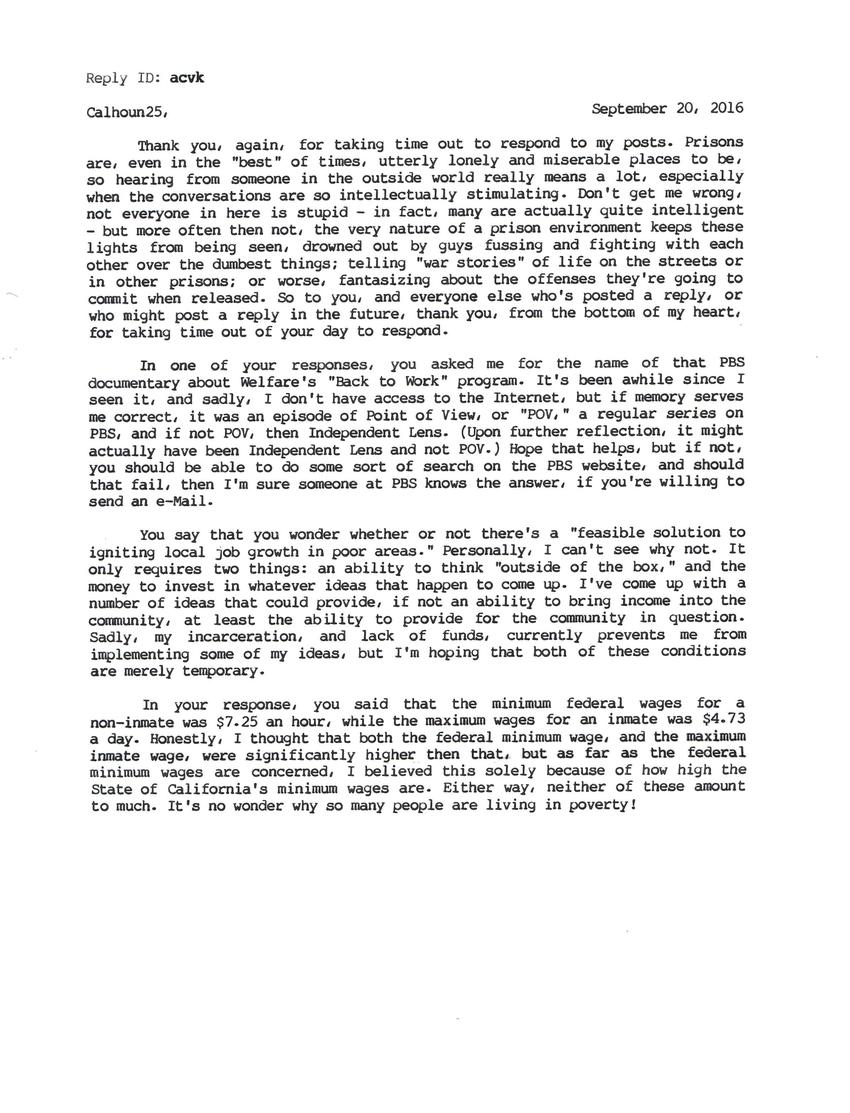
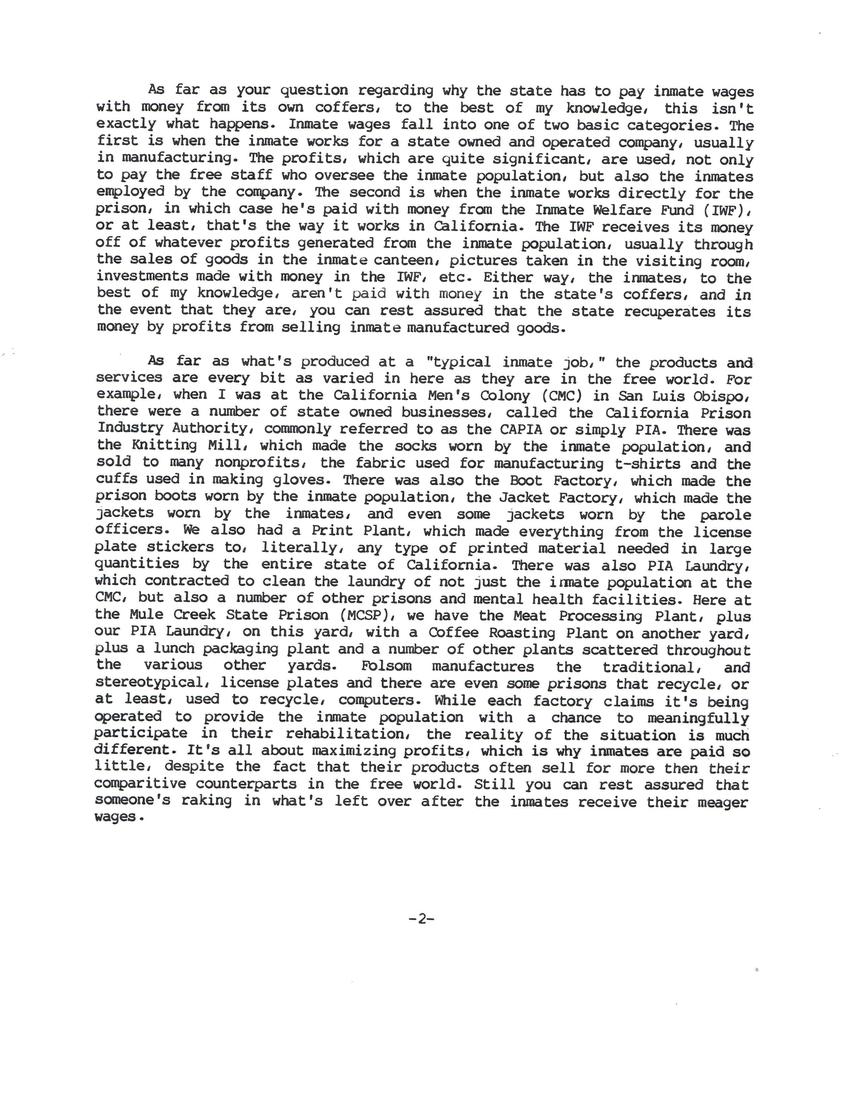
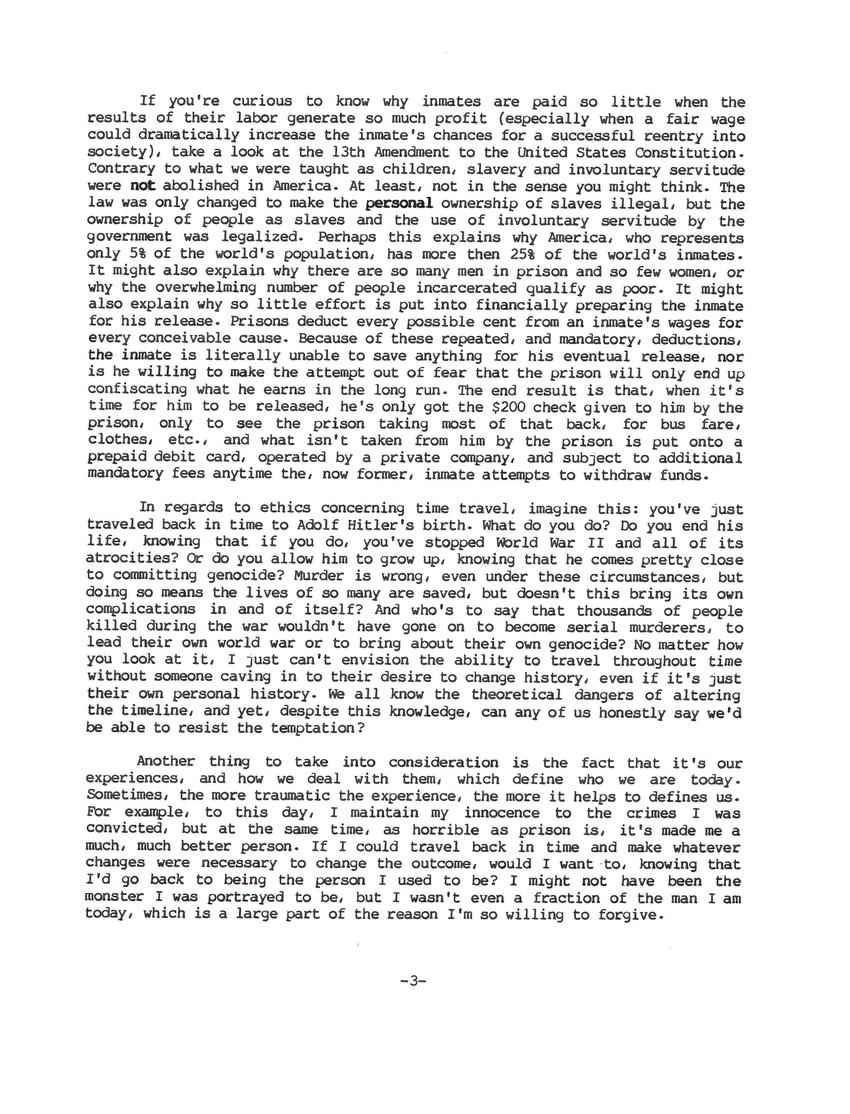
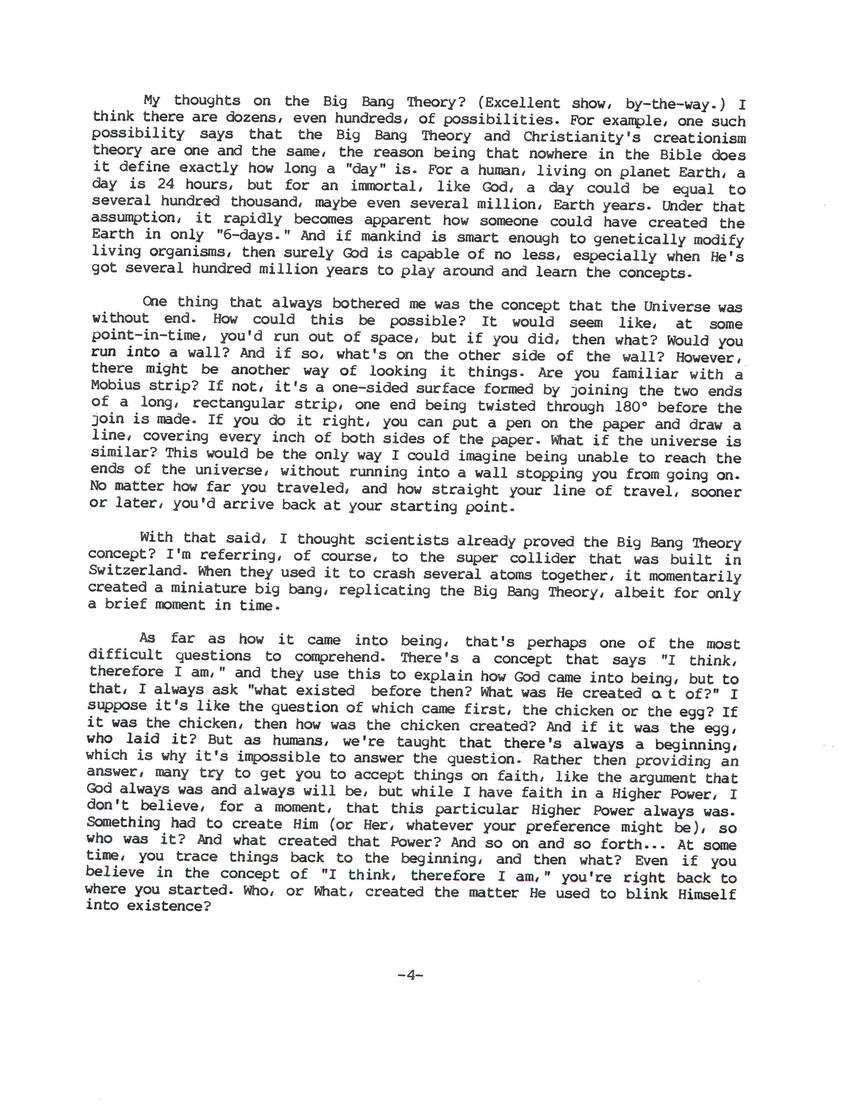
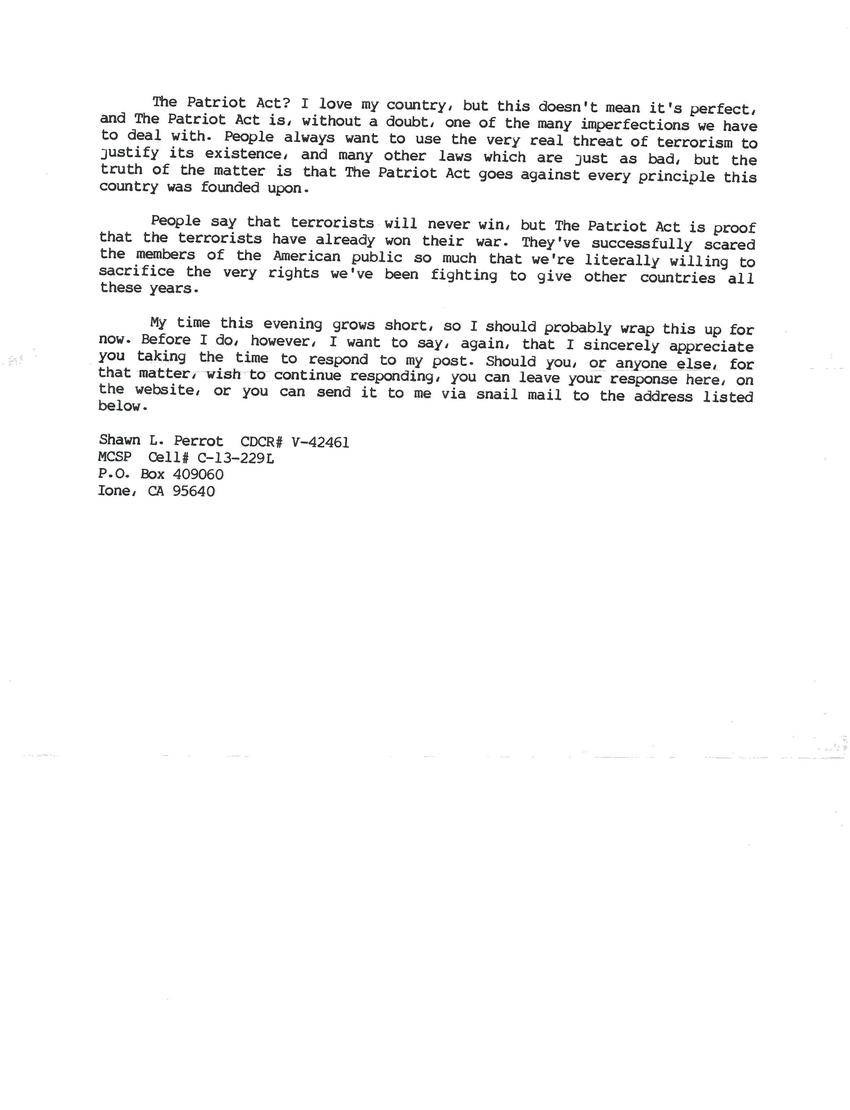

Replies (1)